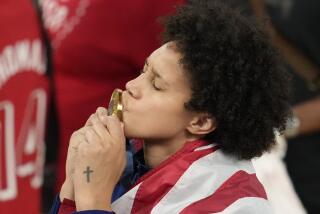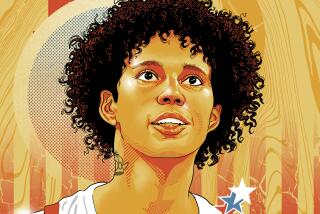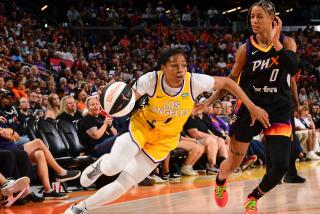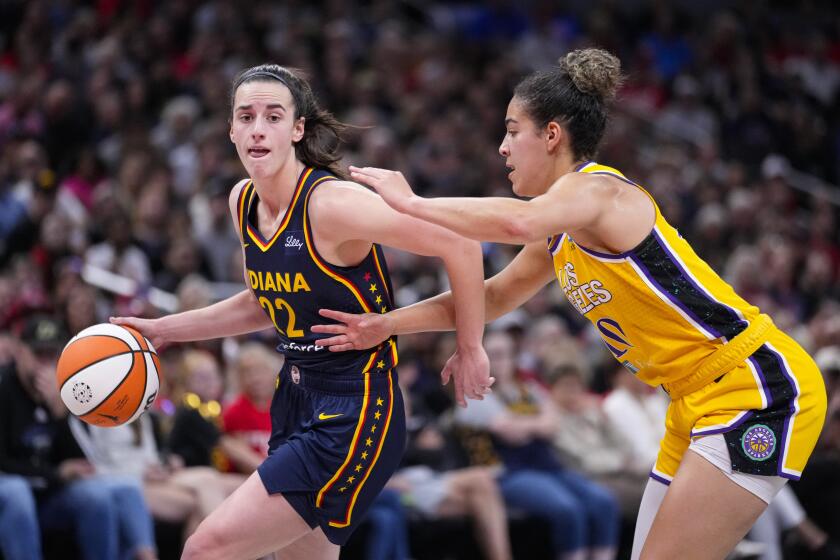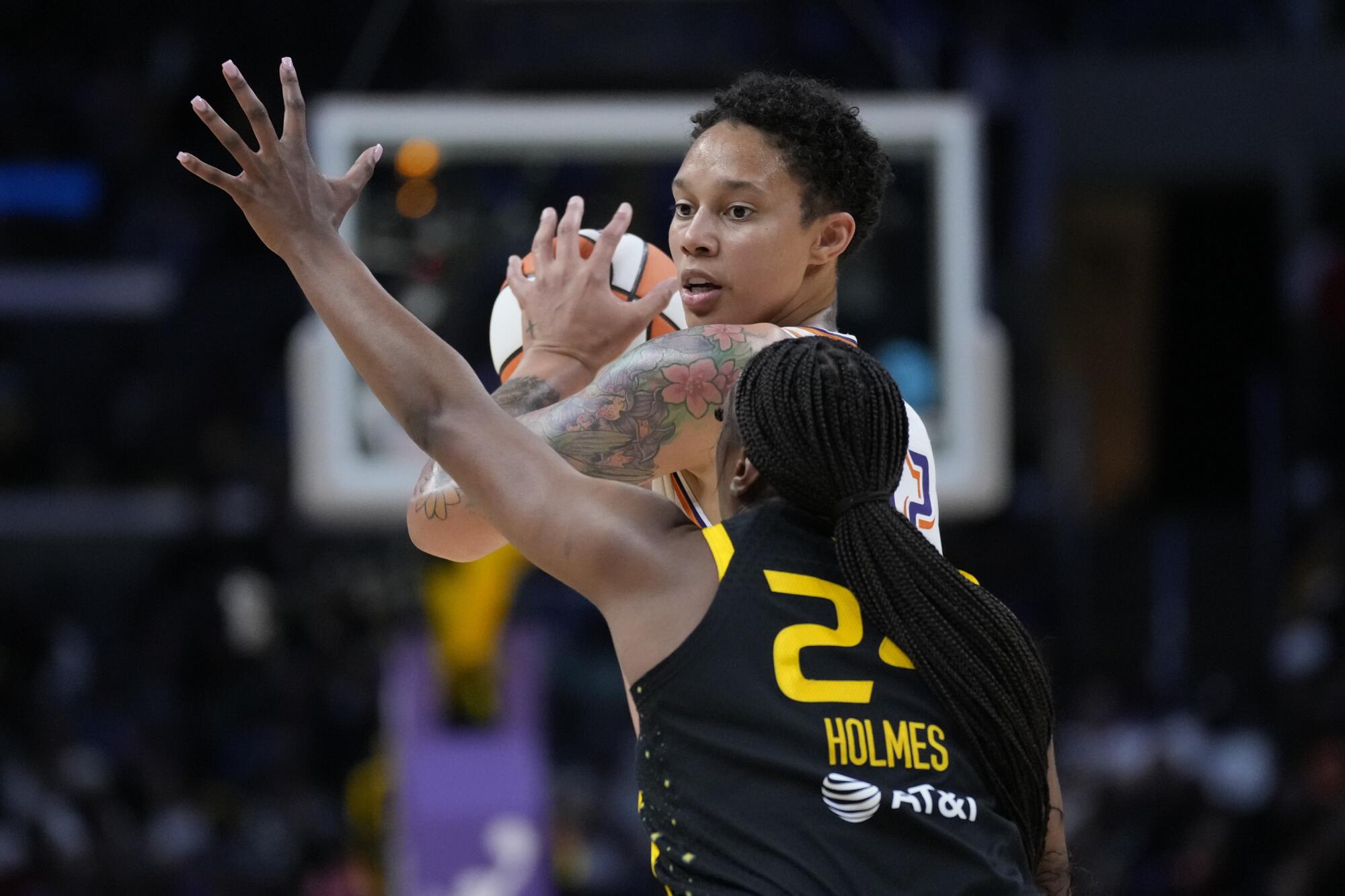
- Share via
Well, I am here, as Ms. Griner requested of us.
All of us, I may add. Fans, media, patrons and phonies — the entirety, included. Come, now. Don’t make that noise. There’s plenty of room for us in the cold corners of the Crypt.
And anywhere would be a welkin, let Brittney Griner tell it. Anywhere but where she’s been.
It had been some 500 odd days since any of us had seen Griner suit up in uniform, lumber down the hardwood that turned her from a nobody to a supernova and dazzle spectators with a simple flick of the wrist. But, in those 500 days or so, Griner’s been to hell and back. Crawled and clawed her way out of the Katabasis to embark, from the city of stars no less, on her own hero’s journey. She was no Odysseus, I assure you. Though, standing across from me, with barely 200 people traipsing around the Crypt, I could’ve sworn I saw a god with the flicker of the underworld’s blue embers, still trying to figure out how her new normal worked.
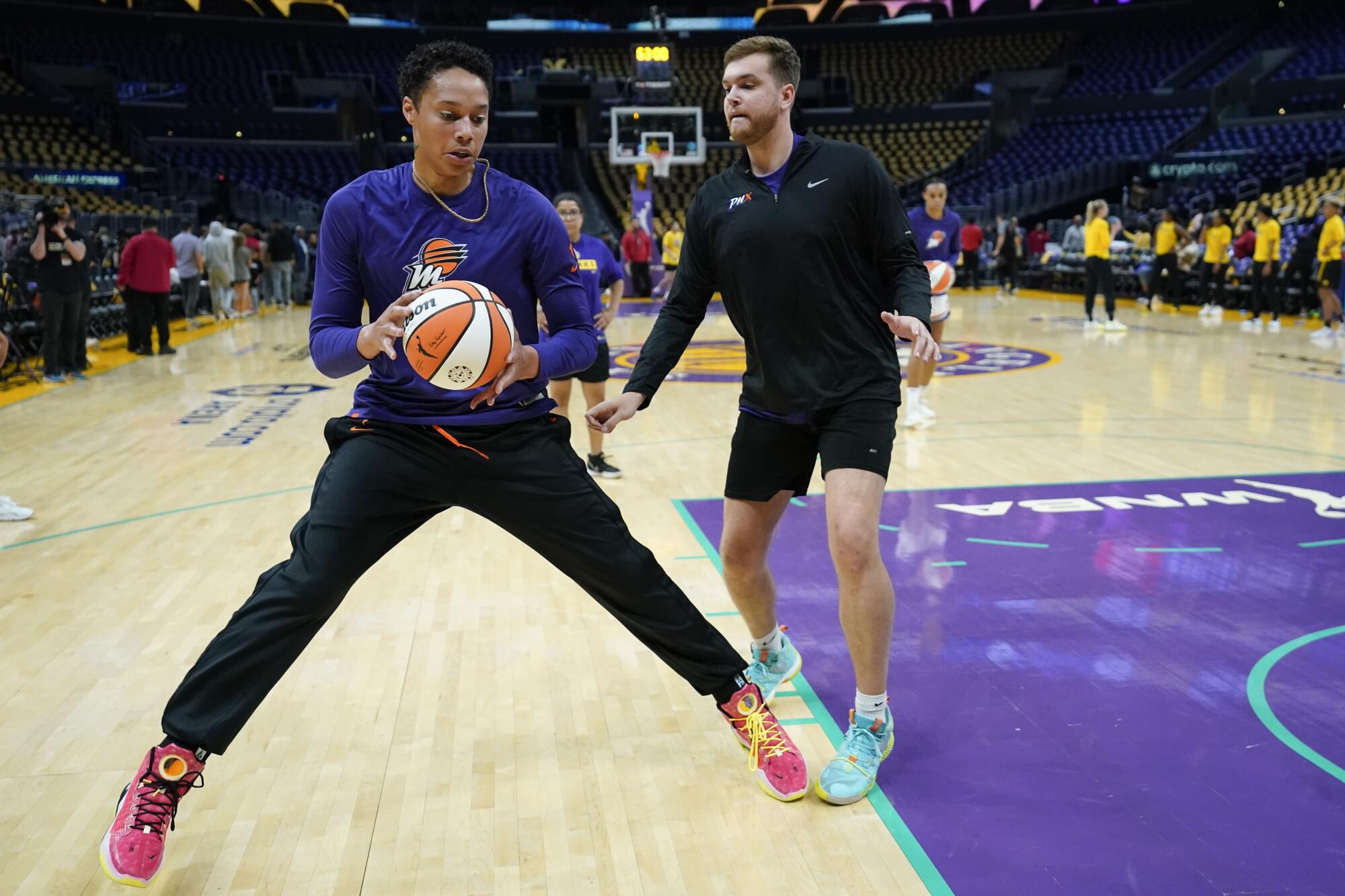
There was a time when Griner’s name was the most feared on the planet when it came to hoops. It’s easy to forget with all of the ceremony behind bringing Griner home from the Russian prison that detained her for 10 months. She set high school records for blocks and dunks as a senior. She was sent to counseling in college to learn how to control her anger after taking pride in breaking a girl’s nose on the court. I remember that Griner from Baylor: a punishing center bigger than anyone in the game in college or the pros, who dunked mercilessly and pushed and shoved her way to being the most dominant force in women’s hoops in a generation. She won a national championship, was named the national player of the year and eventually became the No. 1 overall pick in the WNBA draft. She was an unmistakable phenom. But one controversy attached itself to her as much as success.
Coincidentally, it was isolation in Russia while playing for UMMC Ekaterinburg that made Griner mature. She craved the cold summers across the world, not only for the paycheck but for what it did for her mentally. Years later, divorced from Russia in the past and present, here was a different Griner. A woman returned to American soil a hero, shown to the world as a symbol. Both of the perils of basketball and its unheralded reach.

Ninety minutes before tipoff, teenage Black girls bobbed and weaved their way down into the Crypt. In the middle of the arena were rows of folks in black shirts, patiently waiting for Griner to rise. She sat along the visitors’ sideline, her 6-foot-9 frame squished into the shiny pleather. A thin, gold rope chain was sprinkled between her Phoenix Mercury warmups. She turned her head to the right, only a crown tattooed under her ear was visible to the roundabout. She barely said anything that far away from tipoff.
As she stood up from the bench, the small gathering swooned. The way these kids were actin’, it was as if they saw Lazarus return from behind the rock. It wasn’t as magical of a moment for Griner. She was still shaking off the rust. She’d barely felt a basketball while caged in a labor camp. Her fans wanted to see what was locked away from the American imagination. Griner just wanted to hit a shot.
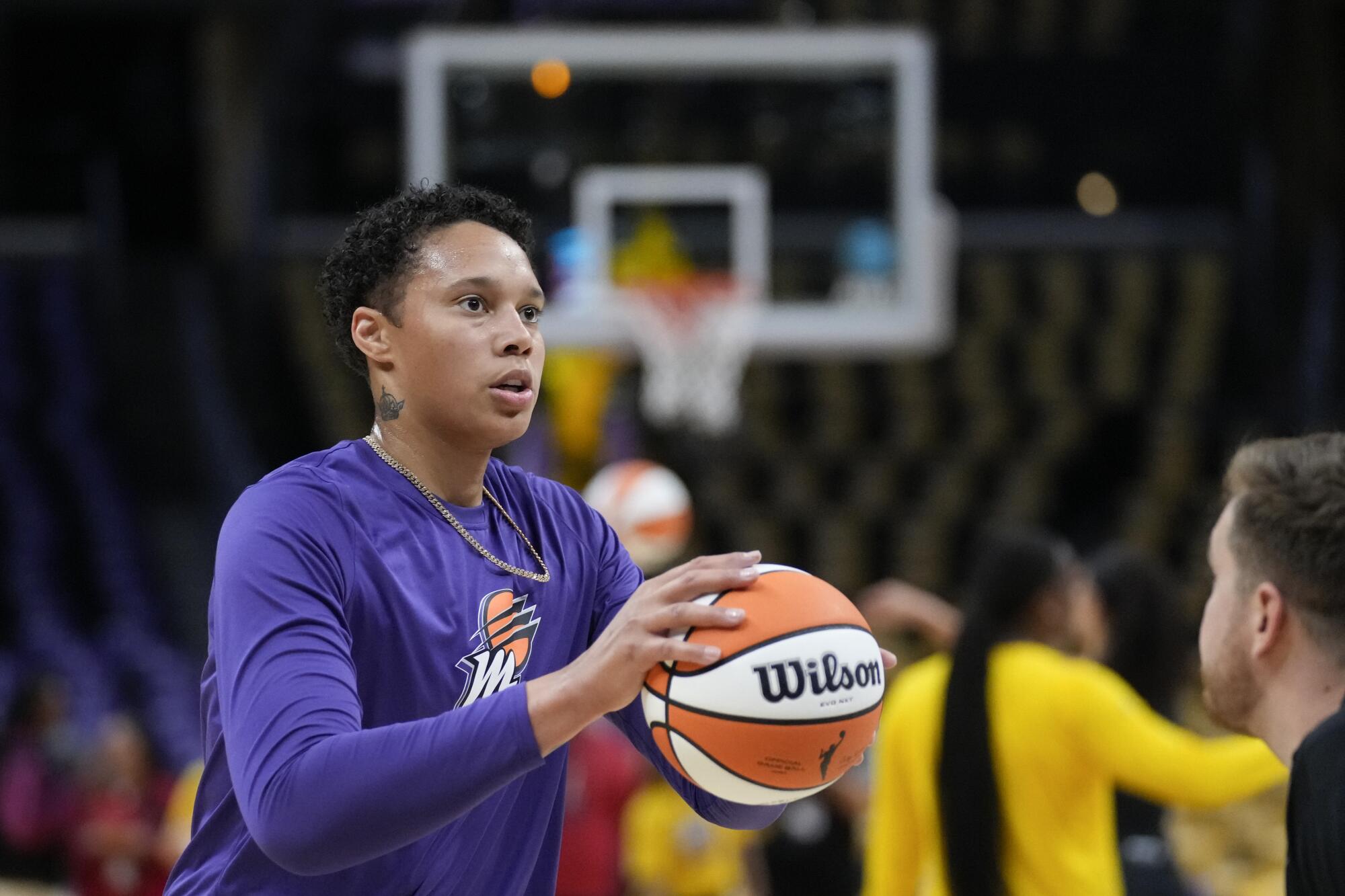
She moved toward a corner of the Crypt and got loose, attempting to warm up as she would any other night. Her elbows looked stiff, and she could barely push the ball from her fingers. The white and orange on the WNBA ball flew from her hands and concocted a wretched sorbet of ineptitude. She was dangerously out of rhythm, a death sentence for a pro hooper. The clanks jangled the heavens. Sometimes two in a row. Other times: five.
“Aghhhhhhh!!!,” Griner groaned out by the three-point line. She hoisted another heave, contorting her arc into a raggedy spiral of a thing.
Clankkkkk.
“Nooo!!!” she shook her head.
She tried again.
Left hook.
Clankkkkkkk.
It still wasn’t there.
Everything in her game still seemed intact, as fluid as she was almost two years ago when she was competing for an MVP trophy. The spin move? Golden, as slippery as 10 years ago at Baylor. The athleticism? Dominant, she got around that side of the floor with ease. But, like any savant of the sport, she was a perfectionist. The bricks were haunting her. She wanted to play 40 minutes a night, if she could. And by the All-Star break, she wasn’t only determined to do that, but to return to the MVP form she left.
So, naturally, Griner yelled at a duo of ball girls to get the hell out of her way. She told an assistant she wasn’t done yet and burst to the strong side of the court for another round of jump shots.
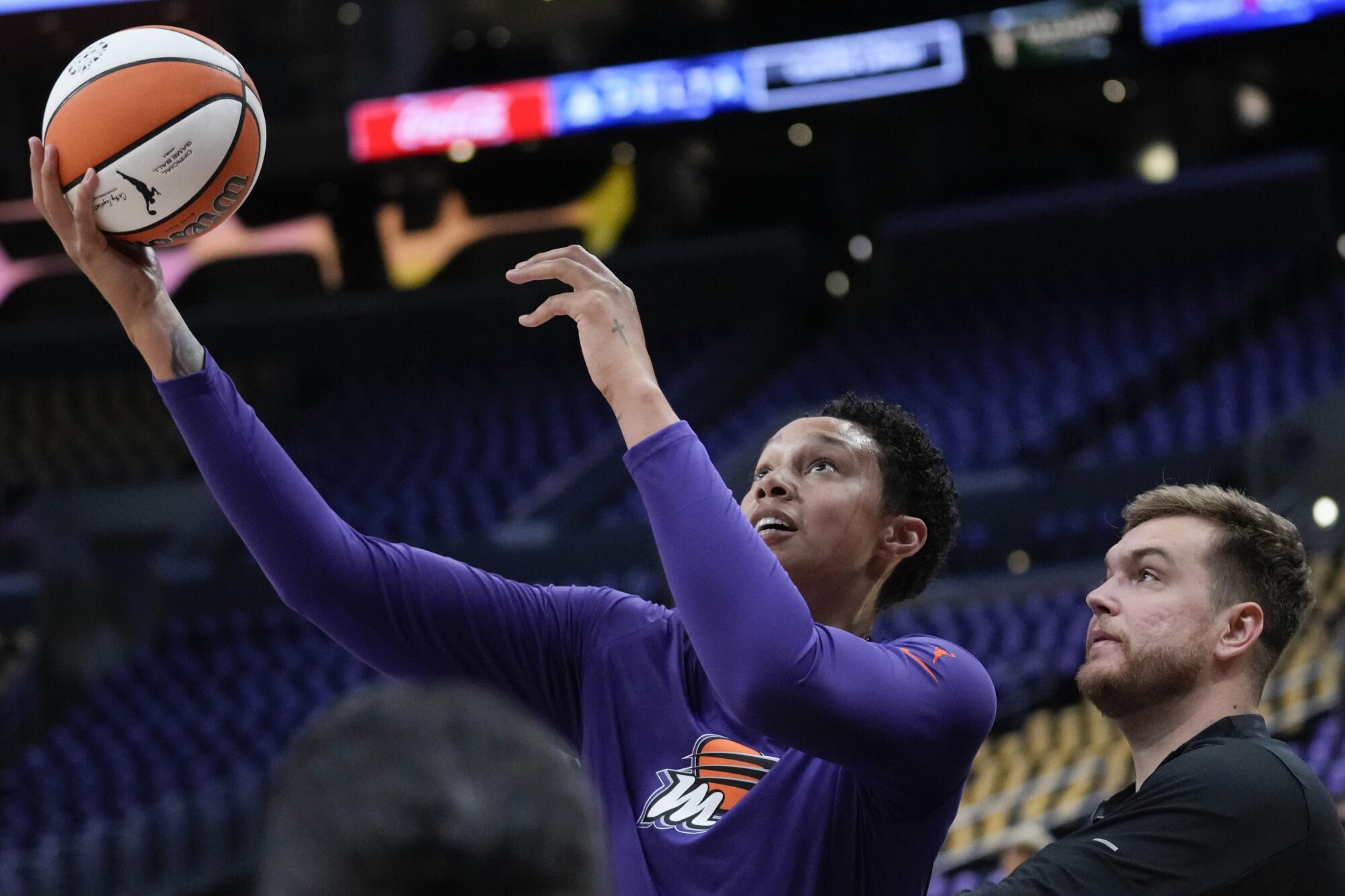
She went on to free throws. And when those weren’t enough, out came the dunks.
She took off from the baseline, her hulking silhouette hurtling toward the rim. She hung there for a millisecond longer than usual, and when she returned to the ground with us mortals, a funny occurrence happened. She looked down and grasped at her hands. Griner grimaced, just a bit. Enough for her to notice. Her face stiffened. Even the rim was humbling her, now. All that time away, it looked like she forgot what it felt like to fly.
She fled the court, behind cheers from her fans and signs illustrating the historic evening. But back she ran, all the way toward the locker room, behind a few ropes of Secret Service and machine guns manned by the local infantryman. Griner’s wife, Cherelle, appeared from the other side of a large door with a smile on her face.
“Is that sweat?!” Cherelle asked.
“Of course,” Griner said, with a knowing smile.
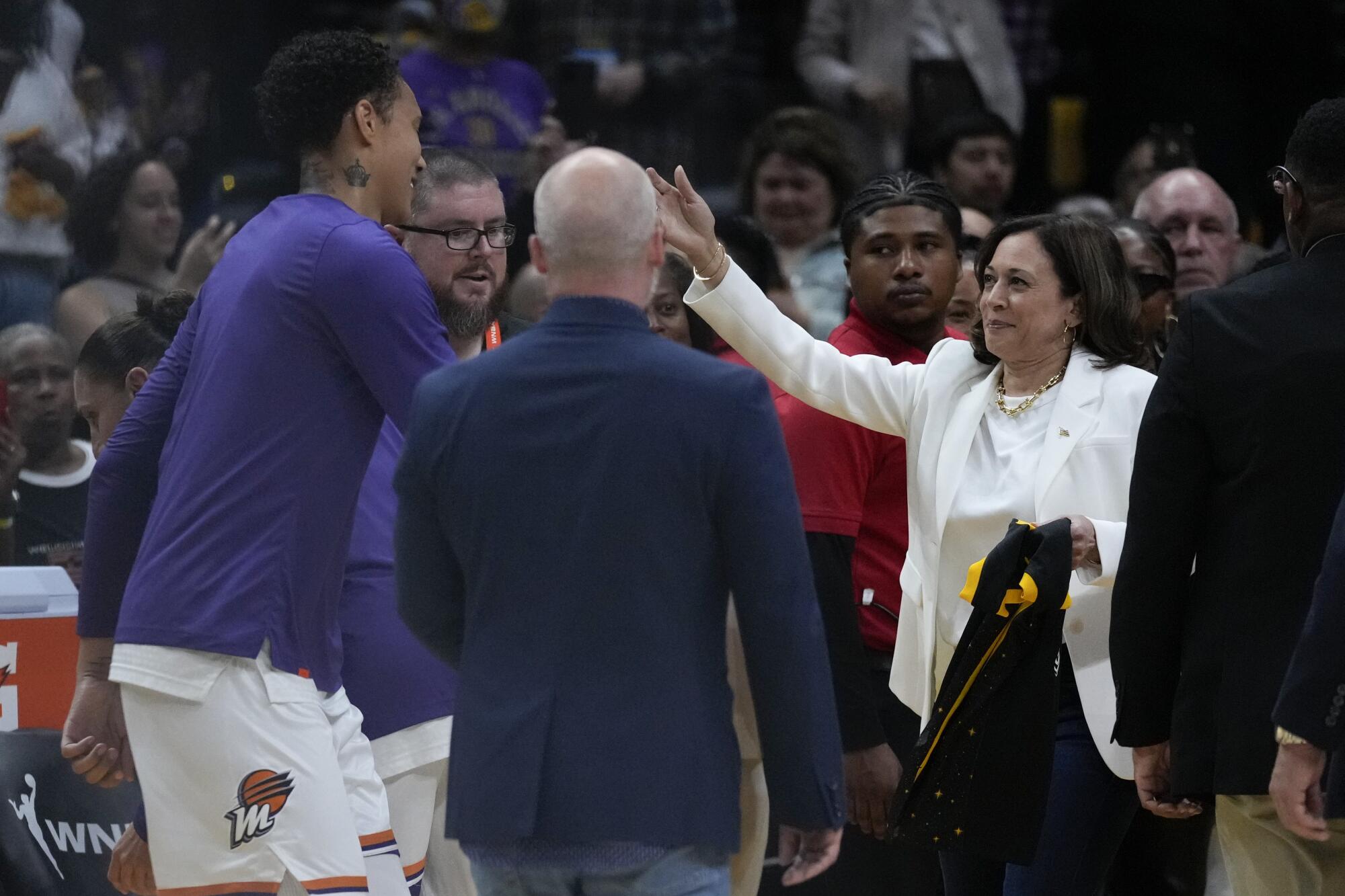
Behind another set of doors was a special guest for the evening: Vice President Kamala Harris. The vice president flew in to celebrate the evening with Griner. After a few minutes of conversation, and Harris’ address to the Mercury locker room, she left her chambers next to the L.A. Kings’ insignia, with Commissioner Cathy Engleberg in tow, sporting a smile that could halt lava. In fact, upon seeing the dignitary, somebody’s mama shouted, “Oh, my God, it’s Kamala Harris!” only for Harris to spin around in one motion, smile wider and shrug her shoulders, imitating Michael Jordan in Game 1 of the 1992 NBA Finals. “That’s right!” she said, with glee. “It’s meeee!” Next to her was some guy named Doug who feverishly pointed out, to anyone who’d listen, that he was here to support his “hometown Sparks” while showing off his — seemingly brand new — jersey.
As Griner stepped back on the court, the lower bowels of the arena were full. Ten thousand, give or take, showed up to give her a hero’s welcome. When Griner’s name was announced, she looked toward the rafters in disbelief. Cherelle could be seen wiping away a few tears from below her sunglasses. As much as Griner wanted to just put on her hard hat and head into work, she took a few seconds for herself to hear the crowd. To hear the teenagers in Section 210 who were crying because of whom they saw on the floor; to hug the luminaries courtside who couldn’t bear to miss the moment she came back to us through basketball.
Griner said, that night, that the wave hit her, despite her steely disposition. For a few moments, she felt a lot older sitting on that bench.
“It was a flow of emotions,” she said. “I didn’t get to experience that for a while.” She tried to go back to who she was: the anonymous, rough uniquity of women’s basketball. “I’m at work,” she said. “I’ve got a job to do. I can’t get caught up in the moment.”

A few minutes after the Mercury won the tip, Griner ran down the floor and erased a shot from a Sparks player off the glass like a giant shooing a gnat. Griner swatted another not too long after that, jawing at a player and reminding them what had to be earned in the trenches of the paint. With all the fervor about getting Griner back, it was almost like some of us forgot whom we were inviting into the fold.
But, right then and there, it was clear. BG was back, and it almost looked like she never left.
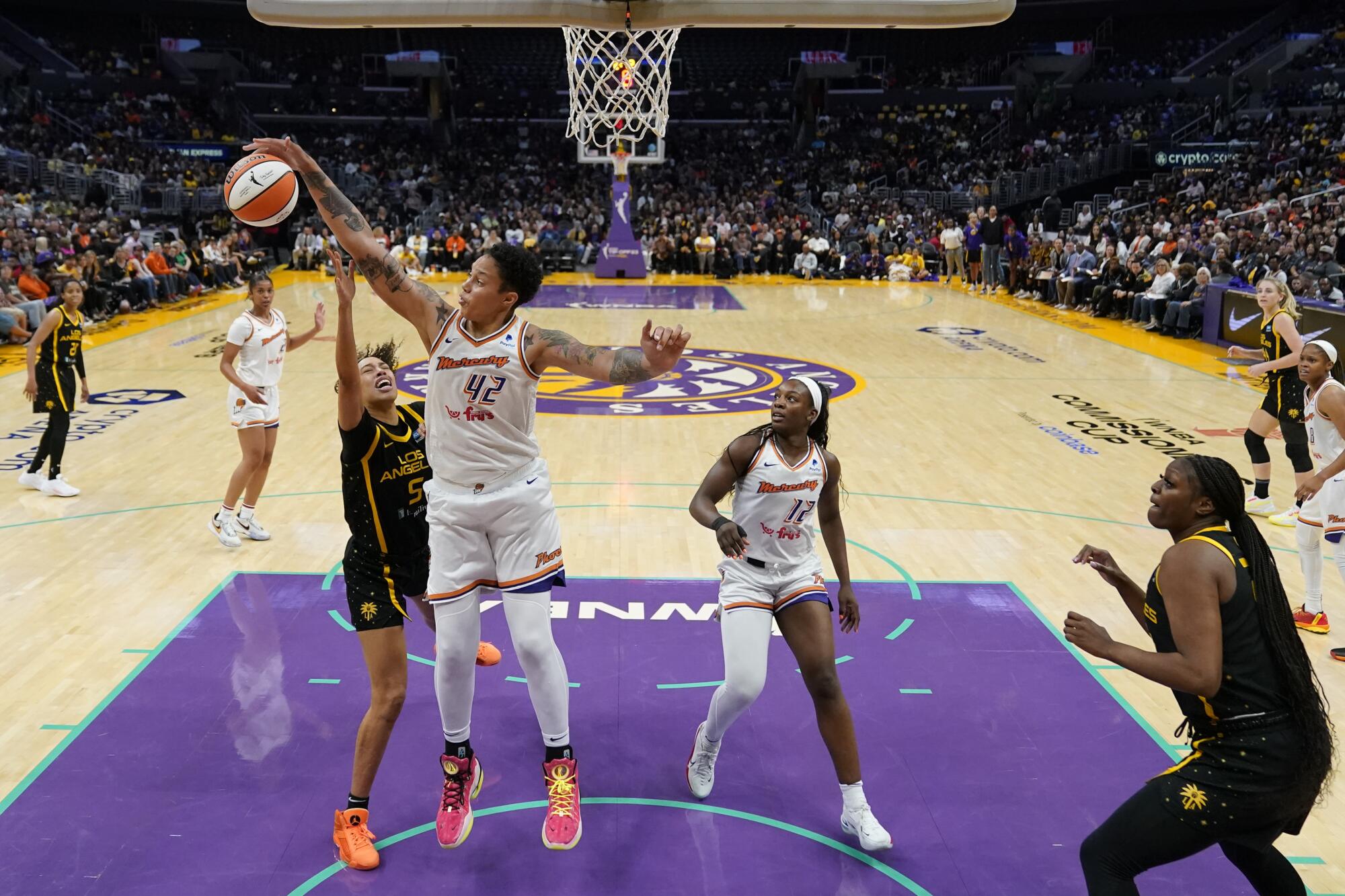
After the game, Griner limped into the media room to listen to the end of Mercury teammate Diana Taurasi’s spiel. There she was, the star of the show, shoeless, feet as pale as they are massive, crouched on the balls of her toes, snacking on a slice of cheese pizza. She pondered what would be the first thing she’d say to the media after her first regular-season game since her detention.
And, well, what would she say? What could she?
Griner tried to smile as Taurasi talked, going back and forth from her brain to the pizza, double-dutching between normalcy and spectacle. She shuffled onto the dais and sat there, alone, the fluorescent beams of light shining brightly, most of all from the top of her head. Griner stared straight ahead. A blank stare betwixt her ears. She scored 18 points in 25 minutes. She had six rebounds and four blocks. But, love, no matter how holy or unrequited, couldn’t replace her hunger.
Plus, ya know, the Mercury lost by 23.
So, what’s the verdict after the first day back on the job?
Griner mugged us before offering up an optimistic answer.
“Not good enough,” she grumbled.
